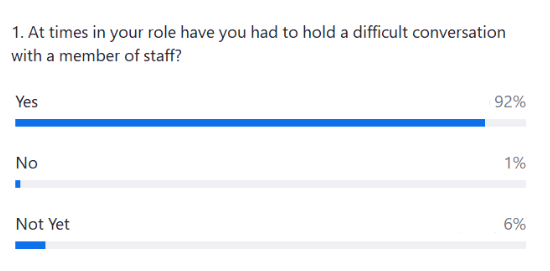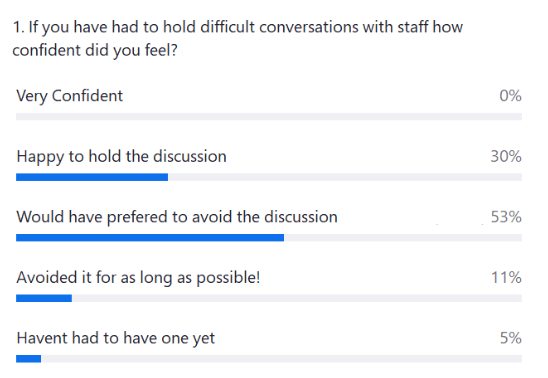Employment Law: Preparing for Difficult Conversations
 - 07.02.2024 (1)_1000.png)
This summary is based on Judicium’s Employment Law ‘Sofa Session’ from the 19th of June, with our resident expert Jenny Salero. This session focused on the importance of difficult conversations, the impact delaying or avoiding these conversations can have and some practical tips to prepare for these conversations.
What is a difficult conversation?
A difficult conversation is any conversation with a member of staff that needs to be dealt with sensitively, either because of the topics/issues to be discussed, or because of the reaction the discussion may evoke.
Poll 1

Poll 2

Why are difficult conversations so important?
If difficult discussions do not take place, it will mean nothing will change. When a member of staff does not know there is an issue – whether that be related to performance, conduct, attendance or interactions with other staff, etc - they are unlikely to change the behaviour as they are unaware of the problem.
Delaying or avoiding discussions also gives the impression there is no problem and is likely to make any discussion (when it finally happens) ten times harder than it needs to be.
It is crucial any issues are addressed directly and as soon as is possible when they arise.
Top Tips to help prepare
These discussions can sometimes feel daunting, even for experienced staff. Thus, we have set out below some of our top tips for preparing for these difficult conversations to help them run as smoothly as possible.
1. Plan – what are you seeking to achieve?
Ahead of the meeting, think carefully about the purpose of the meeting and what you hope to have achieved by the end of the discussion.
If you think you may be sidetracked by other issues or comments the employee may make during the meeting, make notes or a list of key points to cover to keep you on track. If you are a Judicium client, we can assist you with this for any meeting.
Don’t be afraid to push back or arrange discussions on other topics for a later date to ensure you can stay focussed on the arranged topic of discussion.
2. Know your audience
You know your staff so think about the best way to communicate the message and how to invite the colleague to the meeting. As the meeting is not formal, a full letter or email invite is not needed. However, when the staff member likes to be warned in advance of meetings to prepare, think about whether you will do this. But, if the colleague is likely to be very anxious about the discussion if prior notice is given, consider simply asking them to pop to see you when you want to meet.
If you think the reaction from the colleague is likely to be very emotional, make sure you have considered the practical arrangements outlined below. There is no requirement to do so, but you can also consider whether you would like to offer someone to support the member of staff. NB: this is most likely to be relevant when you are meeting for a welfare discussion or to talk about absences.
On occasion we come across members of staff who become confrontational in difficult conversations. When you know a discussion is due to take place with a colleague of this nature, consider whether you would like a notetaker in the room (although this is informal) for additional support.
3. Ensure practical arrangements are in place
It is a waste spending lots of time on planning a discussion or approach only to grab a colleague in the corridor where the discussion may be overheard, which is very likely to make the matter worse!
As part of the above two steps, think carefully about the best time for your discussion – consider:- What does the employee’s day look like?
- When do they teach?
- Do they have some big deadlines coming?
- Are they likely to be upset by the discussion
- If so, do we need to arrange cover or an early finish?
If the discussion is informal there. is no need for a formal letter or email invite. It can just be a case of popping in and asking a colleague to come to see you. Think about what would be best for them.
A location for the discussion is also important. As far as possible, try to avoid holding discussions in key ‘busy’ areas of school. Avoid glass offices – these discussions should be confidential and although we all know people talk, try to avoid the colleague being the subject of any school discussions from the outset!
Consider where you want to sit in the meeting, which may be impacted by the subject you are discussing. Also think about any practical items you may need – water, tissues, pens/paper, etc to minimise interruptions or anything that will detract from the subject at hand.
4. Familiarise yourself with any relevant process
Often difficult conversations are the start of a much larger process such as when improvements aren’t made, or behaviour doesn’t change. These discussions may also take place partway through a process, for example to provide a grievance outcome or feedback on the outcome of a flexible working request. Therefore, it’s crucial if the discussion relates to an HR Policy or procedure, you are familiar with this before the meeting. The employee may have questions about what will happen next or whether they can appeal. If you are familiar with the policy and process this should help you answer these sorts of questions.
However, if you are not sure, do not commit to any answer in the meeting and explain to the employee that you will confirm this after the meeting. Any follow up or next steps will be made much harder if incorrect or inaccurate information has been provided at the meeting.
5. Follow up
We regularly advise clients on this and appreciate everyone is busy, but it is so important any discussion is followed up on. It can be a quick email to recap the meeting – it does not have to be a formal letter. However, conversations that are difficult are often (although not always) pre-cursors to a more formal process and these initial discussions may form part of the paper trail needed to move forward with a formal process.
It is crucial that you not only follow up in writing, but also follow up on anything requested or agreed. For example, if further training or time has been offered or looking into changes to deadlines or adaptations to the workplace – make sure these are done as agreed. There is nothing more frustrating for staff than actions that are not followed up on!
Frequently asked questions
1. Can my member of staff be accompanied?
As these meetings are generally informal, the legal answer is no. There is only a legal right to be accompanied at disciplinary and grievance hearings. However, some policies in the education sector are very generous, so double check!
2. What if they ask to bring a family member or friend?
There is no requirement to agree to this in an informal discussion. However, we always advise is it better for any meeting to take place than argue about who should attend the meeting. This is something we would generally only recommend is considered where there have been difficult personal circumstances or illness, and the colleague could benefit from this support.
3. Do I need to send a formal invite?
No, these meetings are informal so there is no requirement to provide a formal invite (either via letter or email). However, you can choose to do so if you wish, or you think this is what the employee would prefer. Do bear in mind if the employee knows about the meeting in advance, it may give him/her/them an opportunity to avoid the discussion.
4. Can I speak with a member of staff when they are off sick?
Employees have a duty to remain in reasonable contact with their employer when they are unfit for work. Employers should also remain in reasonable contact with staff – there is a common misconception that staff cannot be spoken to. In these circumstances, consider the reason and purpose for the discussions. If the meeting relates to a welfare/absence issue or a pressing disciplinary or grievance issue, there is no reason why the process cannot move forward (although individual circumstances should be considered). However, if the discussion is about planning or deadlines, etc., it can be discussed on a return. Use a common-sense approach to issues where staff are absent?
5. Should I have a note taker or keep a record?
As the meetings are informal a note taker is not generally required and may also appear a bit ‘heavy handed’ for an informal meeting. However, a record should be kept of the discussion. This could be from notes taken at the time, a follow up summary email or letter or even a diary note. It is important a record is kept.
6. Can I have someone attend the meeting with me?
As the meeting is informal, ideally any manager would attend the meeting with the employee on a one-to-one basis, which avoids escalating the matter. If you are concerned the employee may become aggressive or confrontational, you can ask another senior member of staff to attend the meeting, i.e. a note taker. The employee should hopefully not feel intimidated for the member of staff.
7. Do I need to follow up in writing?
Ideally, yes. This does not always need to be in the style of a formal letter – it could be a simple email/re-cap of what has been discussed. Difficult conversations can often be a pre-cursor to a more formal meeting. Therefore, it is good to start the ‘paper trail’ following this discussion.
8. I have a meeting to issue guidance following a parental complaint, is this something that should be disclosed on a reference?
This is likely to be what we refer to as an informal management guidance, or sometimes historically a verbal warning. This is not a formal sanction and although a note of this guidance should be made and placed on the employees file or on internal records, it is not something that should be discussed as a disciplinary issue on a reference.
9. What about informal capability meetings, are these disclosable?
No, any informal meetings regarding performance concerns should take place within the appraisal process before the employee transitions to formal capability. Anything that is informal should not be disclosed on a reference. However, once the formal capability process is triggered, the school has a duty to disclose details of any live warning. In addition, in the two years following any sanction (even if it is no longer live) the school is required to disclose details of the process etc when asked.
10. If I want to have a ‘without prejudice’ conversation, should I invite the colleague and allow them to be accompanied?
This is at your discretion and does depend on the circumstances. If a union representative has been involved throughout, it is advised any discussions take place via the union representative in the first instance. If this meeting is coming somewhat ‘out of the blue’ it is best if the colleague is called into a meeting without warning/a formal invite otherwise the colleague may seek to avoid the meeting by going off sick. It will then be much harder to get any engagement in the discussions.
Want to know more about managing difficult conversations?
Judicium are running CPD accredited training courses: https://www.judiciumeducation.co.uk/training#Scheduledtraining_HRAdvisory
For more information on Judicium’s Employment Law Advisory Service please visit: https://www.judiciumeducation.co.uk/hr-advisory-service
If you require any support in any of these steps or would like to talk to someone surrounding some support for your school, please do not hesitate to call us on 0345 548 7000 or email georgina.decostajudicium.com.
If you’d like to review Judicium’s forthcoming sofa sessions, please click here.
Follow us on Twitter: @JudiciumEDU
Helpful Info:
If you’d like to review Judicium’s forthcoming sofa sessions for next term please click here
Follow us on Twitter: @JudiciumEDU
© This content is the exclusive property of Judicium Education. The works are intended to provide an overview of the sofa session you attend and/or to be a learning aid to assist you and your school. However, any redistribution or reproduction of part or all of the contents in any form is prohibited. You may not, except with our express written permission, distribute or exploit the content. Failure to follow this guidance may result in Judicium either preventing you with access to our sessions and/or follow up content.
Related content
(1).png)
On 27 November 2025, the UK government altered a flagship commitment in the Employment Rights Bill and dropped plans to grant most workers protection from unfair dismissal from their first day of employment. Instead, the Bill will now grant unfair-dismissal rights after six months of continuous service. Read this blog to uncover the reasons why, what this means for schools and how we can help.
(1)(2).png)
In this post, we look at the four ERB Consultations that have been launched by the government and set out links to the consultations so that you can have your say.
.png)
Whats New | Sofa Sessions | HR
In this blog, we'll share the summary notes from our HR and Employment Law Sofa Session from the 19th November, delivered by our resident expert, Kirstie Young.
.png)
In this blog, we will explore the significance of enhancing performance and best practice in education and how it can be implemented effectively.

This blog looks at this impact and suggests strategies for improvement.

In this blog, we'll explore what the Employment Rights Bill is, why it is important and how you can get one step ahead and plan for upcoming changes.

Whats New | HR